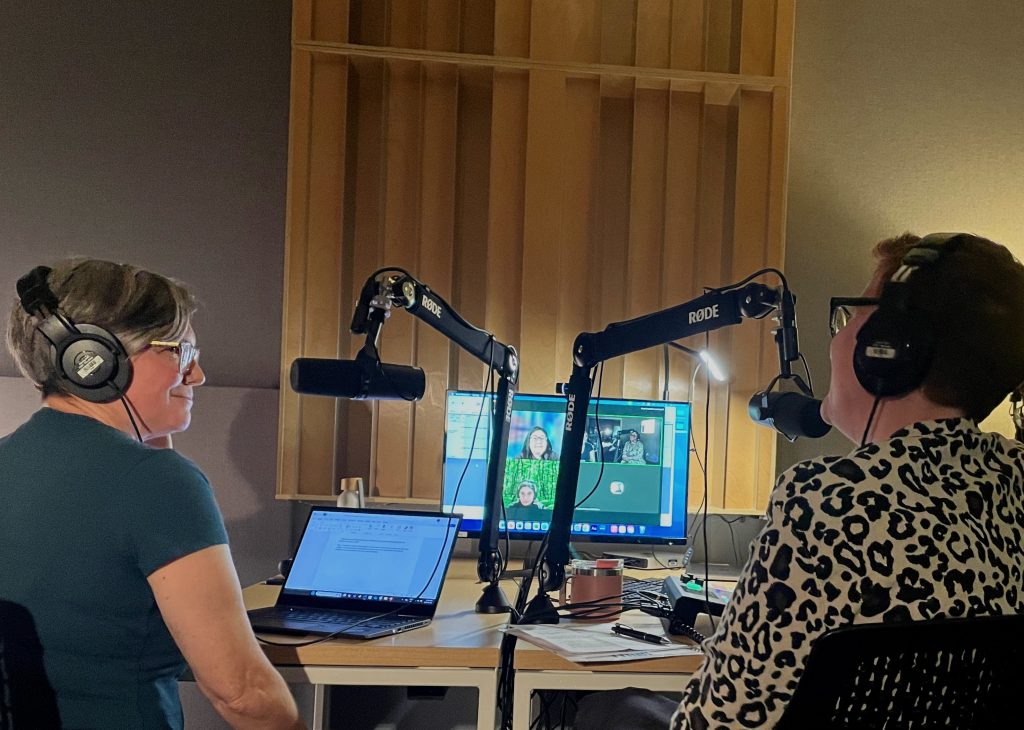Eloping: Autism & Community-Driven Research
“This sort of project, it brings people together… It helps us connect to people who see our value, and who understand the importance of what we experience. And that’s such a different reaction than I’ve gotten in other spaces”
Sandra Nakata

Powered by RedCircle
About the Episode
In this episode, Nicole Corrado, Sandra Nakata, Tina Wilson and Meg Gibson discuss their community-led research project that explores autistic people’s perspectives and experiences of elopement, which is when autistic individuals depart suddenly from supervised settings and relationships without permission or notice.
Rooted in lived experience and informed by a participatory action research approach, the project explores the potential that partnership offers in transforming current practices of policing autistic people’s behaviours and encouraging belonging through understanding. Together, the team shares how the project emerged from community needs, reflects on the harms of epistemic injustice, and explores how rethinking social norms can better support autistic individuals’ safety and autonomy.
The conversation invites listeners into insights into the experiences of elopement and shares hopes for the future of their community research partnership.
Timestamps
01:11 – Get to know: Nicole Corrado
02:08 – Get to know: Sandra Nakata
02:33 – Get to know: Tina Wilson
03:16 – Get to know: Meg Gibson
04:17 – Eloping: Coming Together for Community-Driven Research
12:42 – What is Eloping?
16:54 – Elopement, Community Responses and Safe Elopement Strategies
21:52 – Epistemic Injustice and Autism
25:32 – The Experiences Behind Elopement
28:57 – Alternative Sociality and Re-Orienting Towards Community
34:20 – The Elopement Project: Looking to the Future
Mentioned in this Episode
Project: Eloping: Autistic people’s perspectives on departure and well-being
Organization: Cube of Truth

Our Guests
Nicole Corrado is an autistic woman based in the Montreal area. She developed the Autism and Elopement study after discovering there were no studies on elopement that investigated autistic people’s perspectives on why they may elope. As someone who has experienced elopement herself, Nicole Corrado wishes to provide a first person perspective on the behaviour. Her lived experience has also contributed to her work at a civilian position with the Toronto Police Services Missing and Missed Implementation Team, an advisory committee dedicated to improving missing persons policies. Nicole Corrado is also a visual artist. Her work can be seen at www.nicolecorradoart.wordpress.com
Sandra Nakata is a late-diagnosed autistic woman, a cat mom and a self-proclaimed snailblazer. She has recently relocated to Regina, Saskatchewan, where she is flourishing in her retirement.
Meg Gibson is an associate professor in Social Development Studies and Social Work at Renison University College, University of Waterloo, Canada. Their scholarship and teaching focus on queer and trans studies, critical disability studies, social work, feminist research methods, and the history and philosophy of social services. Current research explores several areas: the perspectives of Autistic people on “eloping” or departing suddenly from places; the ways in which different people understand and use “neurodiversity”; and the experiences of diverse parents (particularly 2SLGBTQ+ and/or disability-identified parents) in meeting the care and work responsibilities in their households — and how policy can best support them.
Tina Wilson is a assistant professor at the UBC School of Social Work, working in the history and philosophy of social work and social welfare, exploring the evolving encounter between scientific and social movement knowledge for how they influence understandings of social justice and social progress. Tina is particularly interested in how material semiotic infrastructures stabilize versions of social justice and how people relate to and work to change these infrastructures and versions in different places and times.
Prior to entering the academy, they worked for about 15 years in direct practice in Toronto, Canada, primarily as front-line staff in the homeless shelter system, in staff training and program evaluation, and in various forms of worker, network and social movement organizing. Tina remains committed to the everyday pragmatics of place-based anti-poverty work.
